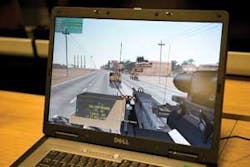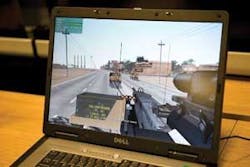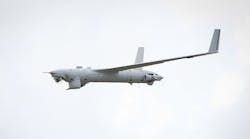By Courtney E. Howard
MONTREAL–Software developers are increasingly adopting commercial off-the-shelf (COTS) solutions to deliver state-of-the-art training, simulation, and mission rehearsal systems. By harnessing all the graphics power and capabilities offered by mainstream computing and gaming hardware and software solutions, today’s military training systems provide trainees–who were raised on Microsoft Xbox, Sony PlayStation, and online games–with simulations that are as real as possible within the digital realm.
“The line between games and traditional simulation is blurring, advancing the applications of artificial intelligence (AI) in the serious games markets,” says Nick Giannias, vice president of research and technology at Presagis in Montreal, Canada. Serious games are games developed for non-entertainment purposes, such as to train, educate, instruct, or persuade.
“Today’s generation of student civilian drivers and new military recruits expect nothing less than high-fidelity, highly realistic character behaviors and environments,” says Giannias. “Through our work with industry leaders like Raydon, our customers are bringing the innovation from commercial gaming to defense and other government organizations requiring dynamic training scenarios.”
The Virtual Combat Convoy Trainer (VCCT) from Raydon Corp., a virtual learning company in Daytona Beach, Fla., is considered the world’s most widely used convoy trainer. It offers convoy training with a 360-degree field of regard, a dataset of recognizable Middle Eastern structures and terrain, and RPGs, IEDs, snipers, suicide bombers, civilian activity, and pedestrian and vehicle traffic.
Raydon engineers use AI.implant, Presagis’s AI development tool, in the production of dynamic, immersive, and realistic driver-training scenarios. Using the AI middleware, Raydon delivers military convoy driving scenarios and state-regulated civilian driver-training simulations that offer unpredictable character and vehicle behavior patterns, such as those one would experience in real-world situations.
“To meet our customers’ requirement for dynamic, immersive training systems, we selected the Presagis artificial-intelligence product, AI.implant,” says Kevin Hawkins, manager of software technologies at Raydon Corp. “It offers the same level of AI sophistication delivered in commercial games, but adds a layer of realism that is perfect to include in our gaming technology initiatives.”
AI.implant eliminates the need to develop an internal computer-generated entity capability, enabling the Raydon development team to save resources and focus on creating more compelling dynamic scenarios that engage a video game-savvy generation of trainees.
Using AI.implant, Raydon’s developers infused the gaming engine with large numbers of intelligent computer-controlled drivers and pedestrians who interact with the trainee. The development team also used content creation and visualization tools from Presagis, including Creator and Terra Vista, to create realistic worlds within the trainer. These realistic environments and intelligent characters are key to creating immersive environments that reflect real-life situations the trainees are likely to encounter.
Soldiers in the Royal Logistic Corps in the U.K. are using a serious game to hone both their driving skills and their ability to cope under fire.
The United Kingdom Ministry of Defense’s (MoD’s) Joint Combat Operation Virtual Environment (JCOVE), a high-tech virtual training solution, uses Virtual Battlespace (VBS), a commercial serious game application. VBS, a military training simulation developed from commercial computer games technology, offers scenario generation and editing to enable instructors to change the training scenarios on the fly.
JCOVE enables members of the British Armed Forces to practice tactics, techniques, and procedures for road convoy operations in a realistic virtual environment. Its Voice Over Internet Protocol (VoIP) communication system enables trainees to speak to each other using headsets, and control the vehicle with a steering wheel and pedal sets. Using the hardware and software system, soldiers learn how to operate under a variety of events and scenarios, such as being under fire, road side bombs, and an ambush.
RLC personnel transport soldiers, combat supplies, and materials across the battlefield. The drivers also provide security within tactical locations and during convoy moves.
“The MoD is committed to train the U.K.’s forces in the best way possible within a relevant contemporary operational environment, with modern effective equipment that promotes confidence,” says Baroness Taylor, Minister for Defence Equipment and Support. “The Royal Logistic Corps are the backbone of military supply convoys in theater. This latest technology will help save lives on operations.”
Newman and Spurr Consultancy Ltd. in Camberley, U.K., will deliver JCOVE to Op TELIC and Op HERRICK Pre-Deployment Training events in the U.K. and Germany, as well as training in-theater.




